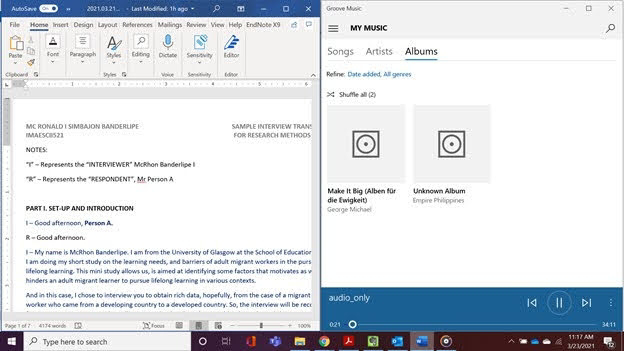(IMAESCII521) Module 9 Personal Post: Transcribing my 'test' qualitative online interview: Experiences and lessons
This morning I completed the first part of my assignment for Module 9. I conducted a simulated qualitative online interview with a very good friend and a Senior Lecturer at a leading university in Singapore last Sunday. Based on the qualitative interview guide which my group developed in the previous modules, I tried to adopt some of the questions there to this interview.
My personal reflections are reflected below:
1. You may have prepared well and studied your questions in advance. But a good time to get to know your interviewee can help warm up the interview session works wonders.
2. You may have initially planned to ask exactly what is written in your interview protocol. However, if you think that certain aspects what your interviewee have already been touched upon, don't ask the same exact question. Perhaps it would help if you ask the interviewee to elaborate more if you think the information you needed is not enough, or are needing further clarification.
3. Read the facial and vocal language of the interviewee. Despite the challenges of not being able to interview face-to-face, you can still observe their facial expressions and emphasis on certain aspects based on their changing tones. If possible, stress or highlight that in your transcribed document.
4. I thought that interviewing participants using Zoom was also a good idea, and it became very helpful to me as I do my transcription. Since I did my setup beforehand, I learned that using the Closed Captions and Record tools can allow you to record the conversation in both audio and video formats, and the captions were also saved too - useful as this will be your initial starting draft for the transcription.
5. I sent my completed draft to the same person I interviewed. He reminded me one important lesson too: to do a faithful transcription of the interview. What he meant is that even the double words and pause fillers such as "You know...", "Hmmm...." adds authenticity to the transcribed material.
6. Acknowledge your position and privilege, as well as your interviewee's. Most often than not, our enquiry is based on the position that we know everything and interviews are there to validate our assumptions. I am not saying that we should not insist on our position in the interview. But perhaps make it not too obvious. Otherwise, your interviewee will resist and may deflect your responses. (Note that they can also have the power not to reveal everything to you).
7. Be humble. I cannot emphasise this more enough. You are taking off a person's precious time to sit down and have a conversation with us. In humility, we demonstrate politeness, willingness to learn something, while remaining conscious of the person's position and worldviews, and gratitude.
And lastly, do not be afraid to try one. I have done it. I still think about it and continue to reflect on it.
So voila, this is really, really is it!!!

.jpg)
Comments